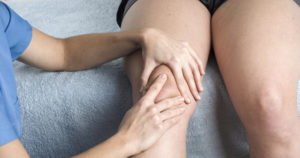
Sore, aching knees might seem like a problem only older people experience, but guess what? Plenty of younger people have knee pain, too. But while the symptoms may feel similar, younger people tend to have knee pain for different reasons. And that means they’ll need to have different types of care to feel better. Here’s what you need to know about knee pain in kids and young adults.
Common Knee Pain Causes in Young Adults
Knee pain in your 20s is often associated with overuse injuries. When the muscles, ligaments, or tendons are “overworked,” pain, stiffness, and other symptoms can develop pretty quickly. Tendonitis and bursitis are a couple of overuse injuries that are most commonly associated with strenuous activity. But they can also occur in relatively inactive people who ramp up their activity too quickly. Still, while these types of injuries are fairly common in young adults, they’re not the only causes of knee pain.
Patellofemoral syndrome
Patellofemoral syndrome is a pretty common cause of knee pain in young adults. It usually occurs by an imbalance in the muscles that support your knee joint and help it move. Weak thigh muscles or overly tight muscles or tendons around your knee can change the way your knee works, causing areas of strain and pressure inside the knee joint. Over time, these areas can become irritated and inflamed, and before you know it, you can start to have pain around the kneecap and in the front of the knee. People with patellofemoral syndrome might have pain or stiffness when kneeling, squatting or climbing stairs. Some people also experience crepitus, a grinding or grating sensation inside the knee.
Osteoarthritis
Yep, that’s right — arthritis can affect your knees as early as your 20s, especially if you’re an athlete or you’re overweight or obese. Arthritis develops when the protective layer of cartilage inside your knee joint wears down. Some athletes — especially those who do a lot of pivoting, jumping or other high-impact activities — are more prone to arthritis, thanks to the excess wear and tear inside the joint. Repeated injuries to the knee can also damage the cartilage, making it more likely you’ll develop arthritis. Obesity affects your knees in a similar way. The added strain that comes from carrying all that weight weakens the cartilage layer and causes it to break down more quickly.
Kids and teens can have knee pain, too, especially if they’re very active or play on sports teams. Adolescent knee pain usually isn’t caused by arthritis, but it can be caused by the patellofemoral syndrome. Adolescent anterior knee pain is another common cause of symptoms in teens and kids — so common, in fact, it actually has the word “adolescent” in its name. It’s most common in younger athletes — especially girls.
Typically, adolescent anterior knee pain develops as a result of overuse or poor training routines. Most often, it occurs when one set of muscles is worked harder than another. The resulting imbalance can wind up pulling the kneecap out of alignment, causing uneven stress inside the joint. In addition to knee pain, other symptoms can occur, like knee “popping” or “creaking” or aching knees at night.
There is no cure for any type of arthritis. Though, there are steps you can take to avoid and treat the knee pain caused by arthritis. Let’s explore those treatments.
How do you stop knee pain at a young age?
Very often, knee pain in younger patients can be treated with conservative options, like:
- Resting the knee
- Avoiding strenuous activities
- Applying ice
- Taking nonsteroidal anti-inflammatory medicines
- Physical therapy and stretching exercises to “rebalance” the knee
- Light stretching
Depending on your symptoms and your activity level, you might also benefit from:
- Making sure you wear footwear that’s designed for your specific sport or activity
- Making sure you warm up thoroughly before any activity
- Sticking to a regular leg exercise routine to keep your knee muscles strong and flexible
- Avoiding activities that cause pain in your knees
- Paying attention to early signs of pain to avoid “overdoing it”
Although knee pain in young adults and adolescents typically can be treated conservatively, you still need a medical evaluation. Delaying medical treatment can increase your risk of developing arthritis and other serious problems in the future. Dr. Van Thiel is skilled in diagnosing and treating knee problems in patients of all ages, including kids, teens, and patients in their 20s. If you’re having knee pain, get the care you need to feel better — and to prevent permanent joint damage. Contact the office and schedule a knee evaluation today.
Dr. Van Thiel treats knee pain in young adults from all over Wisconsin and Illinois including Rockford, Elgin, Huntley, Dekalb, Crystal Lake, Barrington, McHenry, and Beloit.




